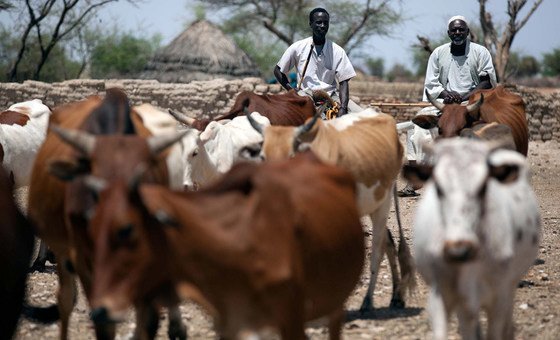South Darfur tribes plan for reconciliation

Herders guide their cattle to a water point in South Darfur (File photo: Albert González Farran / UNAMID)
Efforts to organise a reconciliation conference between the Habbaniya and Salamat tribes in South Darfur have begun in the state capital, Nyala.
The Rapid Support Forces (RSF) command in Nyala received a community leaders’ delegation from East Darfur, headed by Omda El Ajeb Kabbour, yesterday. The visit is part of a roadmap to organise a reconciliation conference between the Habbaniya and Salamat tribes, after two months of armed conflict between them.
This week’s visit finalised the details of the reconciliation conference and determined its location. The Ajaweed (tribal elders) Committee and the negotiators of the two parties were present.
Kabbour told Radio Dabanga that they have made great efforts to spare the blood of the members of the two tribes. He stated that the delegation has sat with the two parties more than 10 times, which succeeded in temporarily stopping hostilities.
The tribes have a long history of conflict. Leaders of the Habaniya and Salamat tribes signed a peace agreement in West Darfur’s Buram in October 2017, after clashes between the two tribes left over 100 people dead from both sides. In June 2011, Radio Dabanga reported that clashes between the tribes left 134 people dead from both sides.
The conflict, which began on November 12, has killed dozens of people on both sides. Disputes over land was reportedly the catalyst “about a week after the Salamat tribe signed a peace deal with a different Arab tribe, the Beni Halba,” as reported by Sudan War Monitor.
Mutual attacks erupted between Salamat and Habbaniya in September and October in Buram, killing and wounding dozens on both sides. A number of villages and parts of a neighbourhood of Buram town were burned.
Multiple clashes broke out in August between members of the Salamat and Beni Halba tribes in Kubum, South Darfur. Dozens of people were reportedly killed. Many others were injured and hundreds fled the violence.
The Salamat, an ‘Arab’ herders’ tribe with roots in Chad, settled in Central Darfur and its surroundings about two decades ago. The Habbaniya cattle herders belong to the Baggara nomads who dwell in eastern Darfur and in Kordofan.











 and then
and then